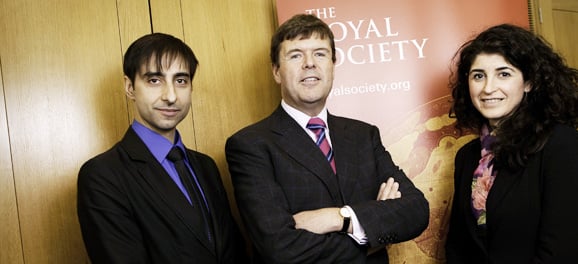
Two researchers from The Institute of Cancer Research, London, Dr Lorenzo Melchor and Dr Maria Vinci, will be swapping a lab coat for legislation, when they visit MP Paul Burstow at the House of Commons for a ‘Week in Westminster’ commencing Monday 2 December as part of a unique pairing scheme run by the Royal Society – the UK’s national academy of science.
During their visit Drs Melchor and Vinci – who work at the Sutton site of the ICR – will shadow their MP partner and learn about his work, as well as attending Prime Minister’s Question Time and meeting Professor David MacKay FRS, Chief Scientific Advisor to the Department of Energy and Climate Change (DECC). The visit will provide Dr Melchor and Dr Vinci with a behind-the-scenes insight into how science policy is formed as well as an understanding of the working life of an MP.
Dr Melchor, Post-Doctoral Training Fellow in Molecular Haematology at the ICR, said: “This is an outstanding opportunity to get the insights of how science policy is discussed and organised at a higher level than in my daily routine. This experience will provide me with a new perspective, more global and multidisciplinary, to observe and look after Science.”
Dr Vinci, Post-Doctoral Training Fellow in Molecular Pathology at the ICR, said: “It’s an honour to have been selected for the Royal Society Pairing Scheme 2013. I look forward to this unique opportunity to enter the House of Commons and take part in MPs meetings, to understand how much they know about the research we do and how we can ensure stronger support from our political leaders.”
Paul Burstow MP said: “Science is at the heart of many decisions we make in Westminster - whether it's the treatment and care people receive in the NHS, or the increasing in human longevity or the big climate change issues which look set to dominate our future.
"Currently, we have only one scientist in Parliament, my colleague Julian Huppert, and science rarely gets the time it deserves in Westminster. I am delighted to be part of the Royal Society Scheme to raise awareness of the role science plays in all of our lives.”
The Royal Society’s MP-Scientist pairing scheme aims to build bridges between parliamentarians and some of the best scientists in the UK. It is an opportunity for MPs to become better informed about science issues and for scientists to understand how they can influence science policy. Over 200 pairs of scientists and MPs have taken part in the scheme since it was launched in 2001.
Sir Paul Nurse, President of the Royal Society said: “We live in a world facing increasing challenges that can only be addressed with a clear understanding of science. From climate change to influenza outbreaks, GM food to nuclear power, our MPs have to make decisions about complex issues that will affect the lives of all those in the UK and, in many cases, more widely throughout the world. This means that MPs and scientists have a responsibility to engage with each other to get the best possible scientific advice into public policy making.
“We set up the Royal Society’s MP Scientist pairing scheme in 2001 to provide the opportunity for MPs and scientists to build long-term relationships with each other and have now organised over two hundred pairings. I know many parliamentarians and scientists who have gained from the scheme, and the shaping of public policy can only improve over time as these relationships continue to grow.”